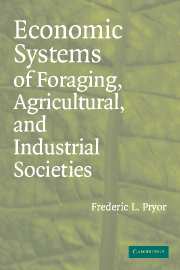Book contents
4 - Economic Systems of Agriculturalists
Published online by Cambridge University Press: 06 July 2010
Summary
In this chapter, I show that agricultural societies featured four quite distinct economic systems. Each system had readily understandable organizing principles that were unrelated in large part to a variety of environmental, social, and political factors that many have alleged to be important. Despite the great differences between agricultural and foraging economies, most of these general conclusions about their economic systems are similar. On a more specific level, however, their differences were striking. The agriculturalists had a much higher average level of economic development than the foragers and the defining characteristics of their economic systems were also quite different. Moreover, in contrast to the apparent lack of influence of the foraging economic systems on a possible transition to agriculture, the type of agricultural economic system had an important impact on a possible transition to an industry/service economy, a topic discussed in the next chapter.
In the following analysis, I first discuss the sample and the criteria for defining an agricultural economic system. Then, I carry out a cluster analysis to determine the types of systems and examine the most important features of each. An important finding is that the complementarities between different economic institutions and organizations were less strong than in foraging and industrial/service economies, so that the individual societies with the same economic system were dissimilar in some important respects. Finally, I examine the degree to which the four types of economic systems were – or were not – related to various environmental, social, and political variables.
- Type
- Chapter
- Information
- Publisher: Cambridge University PressPrint publication year: 2005



